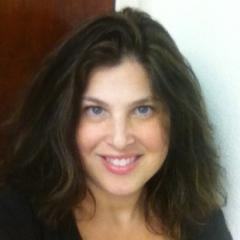
Nothing But Happy
How often do you consider happiness to be a religious obligation? Many of us treat happiness as a luxury, something to be achieved as a reward for accomplishing the goals we set as a matter of urgency – success at work, caring for our children, parents, or spouses, often serving the needs of others at the expense of our own personal pleasure in life. On Sukkot, we are commanded “ והיתה אך שמח - You shall only be happy.” Click here to hear “Samachti B’Omrim Li” by Charles Osborne, Psalm 122, which is added to the liturgy beginning on Sukkot.
The mandate of happiness on Sukkot is not a trivial matter. The full name of the holiday is Chag haSukkot Zman Simchateynu - Festival of Booths, Season of our Rejoicing. On Sukkot we revel in the bounty of food representing the fall harvest that hangs in our sukkah, we retell the story of our salvation, and our liturgy on Shemini Atzeret includes a prayer for rain – that without which we cannot exist, and for which we are completely dependent upon God’s providence. Click here to listen to Cantor Moshe Ganchoff chant “Geshem,” the supplication for rain.
The concept that our own happiness may be not only desirable but required can be bewildering, especially after the admonishments of Yom Kippur. Indeed, on Rosh Hashanah and Yom Kippur, we omit Hallel, the joyous psalms of praise. This is because, we are taught, when a person’s fate hangs in the balance, he or she must approach God with יראה (awe). But we include the full Hallel on Sukkot and Simchat Torah because on the festivals we are urged, עבדו את יה בשמחה – Worship God in gladness!” Click here to hear “Pitchu Li” by Sholom Secunda.
I am living in a time that most people would describe as extreme crisis. One of my children is chronically ill with an acutely painful condition that has no cure and no treatment. My husband was diagnosed with lung cancer over the summer and has experienced complication after complication from the surgery that removed his tumor. In the middle of all of this, my youngest child broke her leg and has been wheelchair-bound for six weeks. Yet, I am happier and healthier than I have ever been in my life.
How is this possible? For the last twelve years, I have been seeking and striving to achieve personal growth and physical and mental health through spiritual and psychological counseling. I utilize many techniques, but there are three core practices that I engage to help me achieve happiness on a regular basis. Acceptance, Anticipation, and Gratitude.
I accept myself. I am human and I am flawed. I am also strong and capable. I accept my feelings. I often feel sadness, fear, anger, and other unpleasant emotions. I don’t allow them to define who I am, however. I am happy because I choose to be happy. This takes a certain degree of effort. I have to allow myself to feel all of my emotions and remember that feelings pass.
I anticipate happiness. I have come to understand that I am the only person in the world whose job it is to make myself happy and to fulfill my own destiny. If I don’t do it, nobody else will. Therefore, I take this responsibility very seriously. I have spent years investigating and experimenting to discover what makes me happy. I try to incorporate something from that growing list into my life every day.
When my son was growing sicker, and nobody could tell us what was happening, I was terrified. The years of practicing this self-care served me well and I was able to continue to survive and even thrive during this difficult period for my family and me.
Whenever I feel somewhat guilty for taking care of myself when someone I love is struggling, I try to remember this aphorism: “Secure your own oxygen mask before assisting other passengers.” You won’t be much help to others if you are passed out on the floor.
The last component to my happiness is gratitude. I try to recognize and acknowledge the multitude of blessings I am continuously receiving. This directs my consciousness toward that which makes me happy, and the emotion follows the thought. Click here to hear, “Mah Ashiv” by Erik Contzius.
When I feel sadness threatening to cover and consume me, I find comfort in the words of HaRav Avraham Yitzchak Kook, the first Ashkenaz Chief Rabbi of Israel. He wrote, in Nafshi Takshiv Shiro,
I had set aside my harp—but I did not break it.
I still see reason for hope.
It is a ray that streams from the East.
I know that I will return
To my song, which I had withheld.

